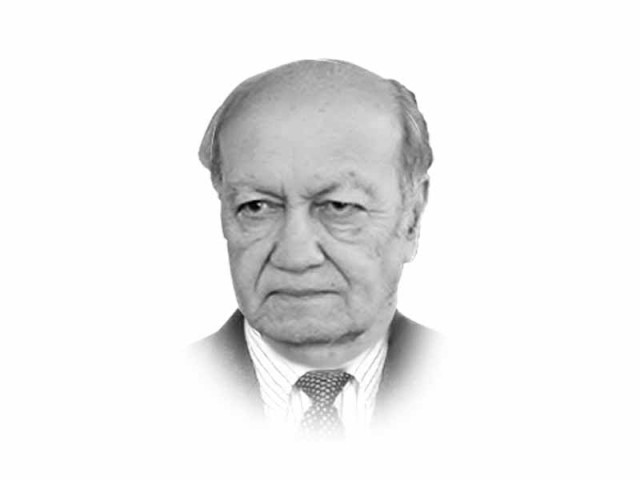Peace remains elusive in Afghanistan
Afghanistan blaming Pakistan has become a routine reflex & a way of deflecting attention from its internal weaknesses

The writer is a retired lieutenant general of the Pakistan Army and a former federal secretary. He has also served as chairman of the Pakistan Ordnance Factories Board

For the new Taliban leader, Mullah Mansoor, the attack served to boost his standing and consolidate his power. On the contrary, President Ashraf Ghani and the Afghan government suffered a major embarrassment and doubts were cast over the future of the democratic experiment. As for the US, its frustrations mounted despite the full backing provided over the years to build the Afghan Army, which has failed to stand on its own. Despite the setback, there is little political stamina left in the US to re-engage in ground operations and it is likely to confine itself to providing aerial and intelligence back-up.
This incident widened the cleavage between President Ghani and Abdullah Abdullah, and demonstrated the fragility of the coalition. It is a sad commentary on the Afghan leadership that at a time when personal and political rivalries should have been set aside to face a common enemy, they are engaged in serious infighting. Petty personal agenda seem to be superseding larger national interests, which regrettably has been the norm. Important posts in Afghanistan remain vacant, as the top two leaders seem to be working at cross-purposes instead of putting up a united front. Although it has been a year since President Ghani assumed office and Abdullah that of CEO, they have yet to agree on most of the important appointments. All this affects the quality of governance, which even in the best of times has been unsatisfactory. These weaknesses play into the hands of the Taliban. The danger is compounded as the Islamic State (IS) is making inroads, which could be very dangerous for the region as a whole.
As expected, the deteriorating security situation had adverse repercussions on Pakistan-Afghanistan relations, which of late have been under stress. The irony is that Kunduz is located in the north and over 1,000km away from the Pakistan border. The Afghan leadership blaming Pakistan has become more of a routine reflex and a way of deflecting attention from its own internal weaknesses. Prudence demands that instead of playing the blame game, the Afghan leadership strengthen ties with Pakistan to face the internal threat. Both the civil and military leaderships of Pakistan have been sincerely pursuing the policy of developing close ties with Afghanistan. There is an unmistakable realisation in Pakistan’s strategic community that it is in the interest of both countries to cooperate with each other, institutionalise stronger mechanisms for bilateral cooperation and put up a united front against the Taliban, al Qaeda and the IS. Pakistan knows well that a chaotic Afghanistan can have grave consequences for itself and South and Central Asia. The time when Pakistan resisted launching military offensives against the Taliban seems to be over in view of the threat that grew from its own brand of Taliban. The December 2014 attack on the APS by the TTP shook the entire country.
Previously, the world stood with the Afghan government to fight the Taliban and now that the US and Nato have withdrawn the bulk of their forces, it has to stand on its own. In these circumstances, cooperation with neighbouring countries becomes critical. Pakistan realises that the growing influence of the Taliban in Afghanistan must be stemmed, as that could be a game changer. Its strategic interest with the Taliban in the past lay in cultivating an ally in Afghanistan to avoid encirclement by India. That theory seems to have lost relevance in changed circumstances because of the rise of the Pakistani Taliban and adverse consequences of an unstable Afghanistan on Pakistan. Prime Minister Nawaz Sharif and General Raheel Sharif have repeatedly conveyed this message to the Afghan leadership to allay their misgivings. When President Ghani took over office, it seemed, for a short period, that relations were on the mend and there was hope, but this soon faded and turned to acrimony. Unless there is a fundamental change in attitude, it would be difficult to build mutual confidence between the two countries. Similarly, Pakistan too has to take concrete measures to allay Afghanistan’s concerns about the Haqqani network’s presence in the tribal sanctuaries. President Ghani was also expecting our military and intelligence agencies to put pressure on the Taliban leadership to engage in a peaceful political solution, failing which, it should squeeze them firmly. The Taliban have to grow from being a guerilla faction to a political party to prevent the endless bloodshed.
For India and Pakistan, Afghanistan remains strategically important and there is a strong belief in Pakistan that Afghan intelligence remains very much under the influence of RAW and the Indian establishment. India’s deep involvement in Afghanistan’s reconstruction has facilitated it gaining stronger and broader influence over the years. Kabul’s insecurities also drive it to lean towards India to countervail Islamabad’s influence.
With the withdrawal of foreign forces and aid drying up, the challenge for the Afghan government becomes even greater. The possibility of exploiting its rich mineral resources for boosting its economy also remain scant due to the security situation and political instability. If the Afghan government fails to deliver and remains mired in corruption, it would only lend strength to the Taliban and other affiliated groups. In such circumstances, it would be unrealistic to expect a peaceful Afghanistan in the near future. Nonetheless, Pakistan and the world owe it to Afghanistan and its people to continue their unabated support.
Published in The Express Tribune, October 7th, 2015.
Like Opinion & Editorial on Facebook, follow @ETOpEd on Twitter to receive all updates on all our daily pieces.













COMMENTS
Comments are moderated and generally will be posted if they are on-topic and not abusive.
For more information, please see our Comments FAQ